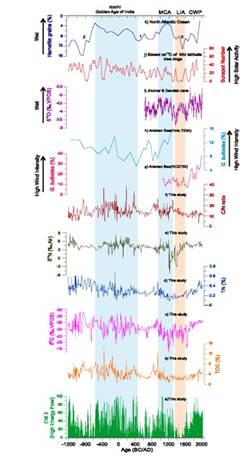Global climate events over the last 3200 years may have caused variations in Indian Summer Monsoon impacting landscape, vegetation, and socio-economic growth: A recent study by WIHG
By PIB Delhi
Global climatic events like the Roman Warm Period, Medieval Climate Anomaly, and the Little Ice Age may have had significant impacts on India’s landscape, vegetation, and socio-economic growth, with abrupt shifts in the Indian Summer Monsoon (ISM) coinciding with these climatic events.
A new study by the Wadia Institute of Himalayan Geology (WIHG), an autonomous institute of the Department of Science & Technology (DST), Government of India, shows wet monsoon conditions in the North-Western Himalaya between 1200 and 550 BCE. This condition prevailed till 450 AD, coinciding with the Roman Warm Period (RWP). It was followed by reduced precipitation and a weak ISM till 950 AD and then strengthened during the Medieval Climate Anomaly (MCA) between 950 and 1350 AD. During the Little Ice Age, there was a pronounced reduction in monsoon precipitation
The study carried out with lake sediments from Rewalsar Lake, a freshwater lake from Mandi district of Himachal Pradesh, could resolve the long debate among scientists about whether such events were local or global. Sediments from this lake preserve signature that can be used as proxies to understand monsoon variability in the past.
In the recent study published in the journal ‘Quaternary International’, researchers obtained grain size data, stable isotope ratios of carbon and nitrogen, total organic carbon (TOC), and total nitrogen data from the sediments of the lake. They retrieved a sediment core of 15-meter length from the center of the lake at a water depth of about 6.5 meters using piston corer, which was used as a sample. The chronology of Rewalsar Lake sediment was then established based on the Accelerator Mass Spectrometry (a form of mass spectrometry to separate a rare isotope from an abundant neighbouring mass) (AMS) 14C radiocarbon dates of fourteen samples and the age ranges from approximately 2950 years to 200 years ago.
Calculation of Total organic carbon TOC, Total Nitrogen TN, and depleted Carbon isotope ratio values during the interval 1200 to 550 BCE indicated wet monsoon conditions in the North-Western Himalaya. This condition prevailed till 450 AD, coinciding with the Roman Warm Period (RWP). This was followed by reduced precipitation and a weak ISM till 950 AD. The ISM became comparatively stronger during the Medieval Climate Anomaly (MCA) between 950 to 1350 AD. During the Little Ice Age, there was a pronounced reduction in ISM precipitation, as indicated by relatively low C/N ratio and decreased TOC content. The findings pointed out to revival of wet climatic conditions with a strong ISM around 1600 AD following the Little Ice Age, which prevails in present times. The variability of ISM in historical past needs to be ascertained to understand present, and future behaviour of ISM as climate shifts and water supply has dictated flourish and demise of ancient civilizations.

Fig. A multi-proxy record of climate change from the Rewalsar lake (Mandi, Himachal Pradesh), showing (bottom to top) a) End Member (EM3) values, b) Total organic carbon (TOC) (wt.%), c) Carbon isotope ratios (δ13Corg) ratio, d) Total Nitrogen (TN), e) Nitrogen isotope ratio (δ15N), f) Corg/N ratio, g) Globigerina bulloides percentages from the Arabian Sea (RC2730) (Anderson et al., 2002), h)
(Publication Link: https://doi.org/10.1016/j.quaint.2020.08.033)























